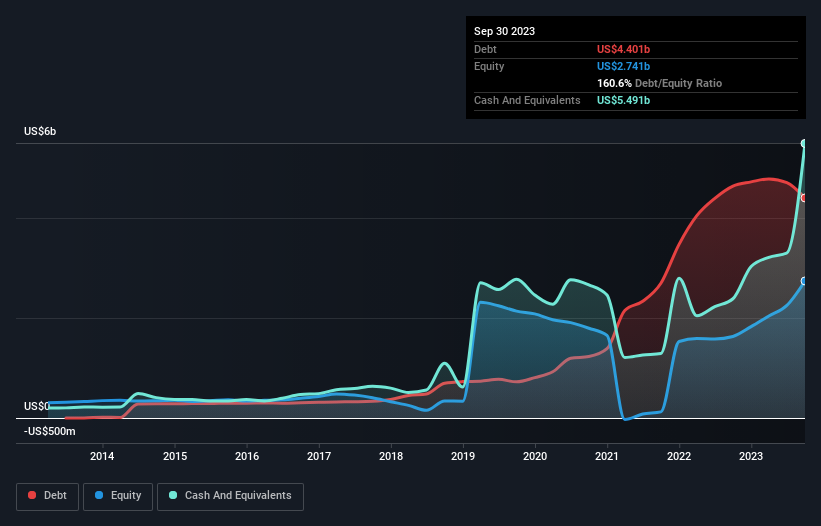- United States
- /
- General Merchandise and Department Stores
- /
- NasdaqGS:MELI
MercadoLibre (NASDAQ:MELI) Seems To Use Debt Rather Sparingly

The external fund manager backed by Berkshire Hathaway's Charlie Munger, Li Lu, makes no bones about it when he says 'The biggest investment risk is not the volatility of prices, but whether you will suffer a permanent loss of capital.' So it seems the smart money knows that debt - which is usually involved in bankruptcies - is a very important factor, when you assess how risky a company is. We can see that MercadoLibre, Inc. (NASDAQ:MELI) does use debt in its business. But the real question is whether this debt is making the company risky.
When Is Debt Dangerous?
Debt and other liabilities become risky for a business when it cannot easily fulfill those obligations, either with free cash flow or by raising capital at an attractive price. Part and parcel of capitalism is the process of 'creative destruction' where failed businesses are mercilessly liquidated by their bankers. However, a more common (but still painful) scenario is that it has to raise new equity capital at a low price, thus permanently diluting shareholders. Of course, plenty of companies use debt to fund growth, without any negative consequences. When we think about a company's use of debt, we first look at cash and debt together.
Check out our latest analysis for MercadoLibre
What Is MercadoLibre's Net Debt?
The image below, which you can click on for greater detail, shows that MercadoLibre had debt of US$4.40b at the end of September 2023, a reduction from US$4.64b over a year. But it also has US$5.49b in cash to offset that, meaning it has US$1.09b net cash.

A Look At MercadoLibre's Liabilities
The latest balance sheet data shows that MercadoLibre had liabilities of US$10.3b due within a year, and liabilities of US$3.08b falling due after that. Offsetting this, it had US$5.49b in cash and US$5.87b in receivables that were due within 12 months. So it has liabilities totalling US$2.02b more than its cash and near-term receivables, combined.
Of course, MercadoLibre has a titanic market capitalization of US$89.4b, so these liabilities are probably manageable. Having said that, it's clear that we should continue to monitor its balance sheet, lest it change for the worse. Despite its noteworthy liabilities, MercadoLibre boasts net cash, so it's fair to say it does not have a heavy debt load!
Even more impressive was the fact that MercadoLibre grew its EBIT by 168% over twelve months. That boost will make it even easier to pay down debt going forward. The balance sheet is clearly the area to focus on when you are analysing debt. But it is future earnings, more than anything, that will determine MercadoLibre's ability to maintain a healthy balance sheet going forward. So if you're focused on the future you can check out this free report showing analyst profit forecasts.
But our final consideration is also important, because a company cannot pay debt with paper profits; it needs cold hard cash. MercadoLibre may have net cash on the balance sheet, but it is still interesting to look at how well the business converts its earnings before interest and tax (EBIT) to free cash flow, because that will influence both its need for, and its capacity to manage debt. Happily for any shareholders, MercadoLibre actually produced more free cash flow than EBIT over the last three years. There's nothing better than incoming cash when it comes to staying in your lenders' good graces.
Summing Up
We could understand if investors are concerned about MercadoLibre's liabilities, but we can be reassured by the fact it has has net cash of US$1.09b. And it impressed us with free cash flow of US$4.3b, being 193% of its EBIT. So is MercadoLibre's debt a risk? It doesn't seem so to us. Over time, share prices tend to follow earnings per share, so if you're interested in MercadoLibre, you may well want to click here to check an interactive graph of its earnings per share history.
Of course, if you're the type of investor who prefers buying stocks without the burden of debt, then don't hesitate to discover our exclusive list of net cash growth stocks, today.
New: Manage All Your Stock Portfolios in One Place
We've created the ultimate portfolio companion for stock investors, and it's free.
• Connect an unlimited number of Portfolios and see your total in one currency
• Be alerted to new Warning Signs or Risks via email or mobile
• Track the Fair Value of your stocks
Have feedback on this article? Concerned about the content? Get in touch with us directly. Alternatively, email editorial-team (at) simplywallst.com.
This article by Simply Wall St is general in nature. We provide commentary based on historical data and analyst forecasts only using an unbiased methodology and our articles are not intended to be financial advice. It does not constitute a recommendation to buy or sell any stock, and does not take account of your objectives, or your financial situation. We aim to bring you long-term focused analysis driven by fundamental data. Note that our analysis may not factor in the latest price-sensitive company announcements or qualitative material. Simply Wall St has no position in any stocks mentioned.
About NasdaqGS:MELI
MercadoLibre
Operates online commerce platforms in Brazil, Mexico, Argentina, and internationally.
High growth potential with solid track record.
Similar Companies
Market Insights
Community Narratives





